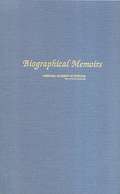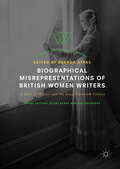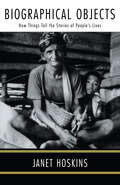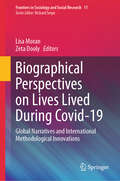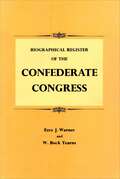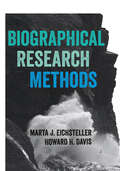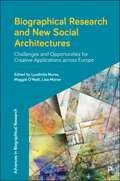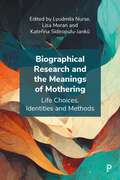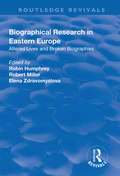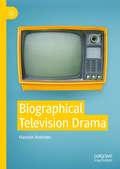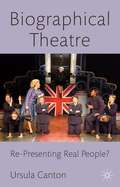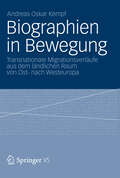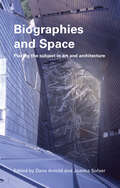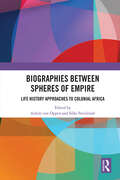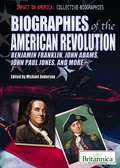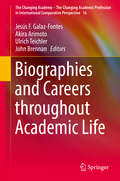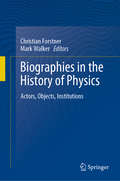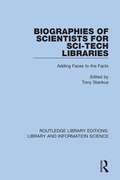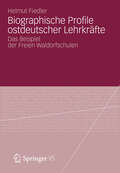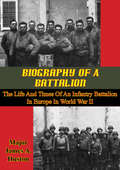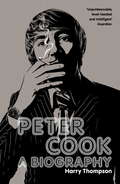- Table View
- List View
Biographical Memoirs: Volume 91
by National Academy of Science the National AcademiesBiographical Memoirs is a series of essays containing the life histories and selected bibliographies of deceased members of the National Academy of Sciences. The series provides a record of the life and work of some of the most distinguished leaders in the sciences, as witnessed and interpreted by their colleagues and peers. They form a biographical history of science in America--an important part of our nation's contribution to the intellectual heritage of the world.
Biographical Misrepresentations of British Women Writers: A Hall of Mirrors and the Long Nineteenth Century (Palgrave Studies in Life Writing)
by Brenda AyresThis book is an investigation of the biases, contradictions, errors, ambiguities, gaps, and historical contexts in biographies of controversial British women who published during the long nineteenth century, many of them left unchecked and perpetuated from publication to publication. Fourteen scholars analyze the agenda, problems, and strengths of biographical material, highlighting the flaws, deficiencies, and influences that have distorted the portraits of women such as Lady Mary Wortley Montagu, Mary Wollstonecraft, Mary Hays, Sydney Owenson, Letitia Elizabeth Landon, Felicia Hemans, Elizabeth Barrett Browning, Caroline Norton, Elizabeth Gaskell, Charlotte Bront#65533;, Lady Florence Dixie, George Eliot, and Edith Simcox. Through exposing distortions, this fascinating study demonstrates that biographies are often more about the biographer than they are about the biographee and that they are products of the time in which they are written.
Biographical Objects: How Things Tell the Stories of Peoples' Lives
by Janet HoskinsFirst Published in 1998. Routledge is an imprint of Taylor & Francis, an informa company.
Biographical Perspectives on Lives Lived During Covid-19: Global Narratives and International Methodological Innovations (Frontiers in Sociology and Social Research #11)
by Lisa Moran Zeta DoolyThis volume elucidates international biographical and narrative perspectives on how COVID-19 influenced people’s daily lives across different countries and contexts. It draws together global interdisciplinary scholarly contributions and conceptualizes the lived life as a complex, multilayered and multidimensional phenomenon that is constantly unfolding both in and across time. Significantly, this volume focuses on seldom-heard groups including persons diagnosed with HIV, COVID-19 dissenters, prisoners, essential workers, waste pickers, refugees and migrants. The chapters focus on the pandemic's multifarious impacts on people’s lived realities in personal and professional domains, exploring the complexity of people’s relationships with family, friends, interactions with colleagues and students and the centrality of emotions, to everyday human experiences, including grief, loss and loneliness as well as moments of joy and processes of personal renewal. This volume explores innovative questions, issues and challenges on the development and utilization of rich, biographical narrative methodologies during COVID-19, addressing important issues like power and voice, and pragmatic questions of how to do biographic research whilst socially distant. Contributions to this work illuminate the multidimensionality of human experiences, adaptability to adverse circumstances and the complexity of working through unanticipated global events whilst reimagining novel social futures.
Biographical Register of the Confederate Congress
by Ezra J. Warner Jr."This is a very valuable reference work, the non-existence of which has long been deplored by Civil War historians. The research, which is impressive, has turned up a considerable amount of detail not generally known, even among Civil War specialists." -- Bell I. WileyThis vital addition to Civil War scholarship is an attempt to rescue members of the Confederate Congress from "postbellum obscurity." Modeled after Ezra J. Warner's two earlier books, Generals in Gray and Generals in Blue, the register contains an introduction describing the makeup of the Confederate Congress, biographical sketches of the congressmen, and a substantial bibliography.The biographical sketches include the place and date of birth, family background, education, means of libelihood, politics, public-service record, and degree of financial and political success of each congressman.The authors describe each congressman's participation in (or opposition to) secession and detail the circumstances of his election to the Confederate Congress. A prominent section of each sketch is devoted to the congressman's activities in the Congress: his position on major issues; his chief interest and the measures he sponsored; and the reason he left Congress. Then, the authors attempt to pick up the lives of the congressmen after the Civil War. The sketches include the place and date of death of each man, as well as the place of burial.Anyone interested in Civil War history will find Biographical Register of the Confederate Congress an indipensable aid.
Biographical Research Methods
by Howard Davis Marta J. EichstellerBiographical data provide unique insights into social life, but they also pose some significant challenges for social science researchers. This book offers a systematic, flexible guide to using biographical narrative methods in your research project. Drawing upon the authors’ own research, as well as case studies from a range of international contexts and disciplines, the book illustrates how biographical approaches can be tailored to different research questions and environments. This book will help you to: · Navigate any complexities or missteps when undertaking real-world research · Apply your analytical and research tools to your research question · Choose the right research design for your project, whether single or mixed methods · Ground your understanding within diverse real-world research examples. Clear, adaptable, and applied, this is your definitive guide to working with biographical methods.
Biographical Research Methods
by Howard Davis Marta J. EichstellerBiographical data provide unique insights into social life, but they also pose some significant challenges for social science researchers. This book offers a systematic, flexible guide to using biographical narrative methods in your research project. Drawing upon the authors’ own research, as well as case studies from a range of international contexts and disciplines, the book illustrates how biographical approaches can be tailored to different research questions and environments. This book will help you to: · Navigate any complexities or missteps when undertaking real-world research · Apply your analytical and research tools to your research question · Choose the right research design for your project, whether single or mixed methods · Ground your understanding within diverse real-world research examples. Clear, adaptable, and applied, this is your definitive guide to working with biographical methods.
Biographical Research and New Social Architectures: Challenges and Opportunities for Creative Applications across Europe (Advances in Biographical Research)
by Tamsin Barber Diana Yeh Magda Nico Ana Caetano Kateřina Sidiropulu-Janků Ciara Bradley Andre Epp Jakub Gałęziowski Sónia Bernardo Correia Anabela Pereira Lynsey Kavanagh Jerzy Stachowiak Fabienne Seifert Oksana ŽabkoThis volume focuses on the place of biographical research in shaping social futures and its creative applications in the new unprecedented societal circumstances caused by the COVID-19 pandemic. Written by experienced and early career biographical researchers, it demonstrates how biographical research responds to the new ‘social architecture’: theoretically, empirically and analytically.
Biographical Research and the Meanings of Mothering: Life Choices, Identities and Methods
by Lyudmila Nurse, Lisa Moran and Kateřina Sidiropulu-JankůWhat does mothering mean in different cultures and societies? This book extensively applies biographical and narrative research methods to mothering from international perspectives. This edited collection engages with changing attitudes and approaches to mothering from women’s individual biographical experiences, illuminating how socially anticipated tasks of mothering shaped through interlinking state, media, religious beliefs and broader society are reflected in their identities and individual life choices. Considering trust, rapport, reflexivity and self-care, this collection advances methodological practice in the study of mothers, carers and childless women’s lives.
Biographical Research in Eastern Europe: Altered Lives and Broken Biographies (Routledge Revivals Ser.)
by Robert MillerThis title was first published in 2003. The transition from socialism experienced by the countries of Eastern and Central Europe during the last decade has been recognised as a profound historical watershed. It is only now, however, that the meanings and dimensions of 'post-socialism' are becoming apparent. The use of the 'biographical perspective' in research provides a unique avenue for studying these changes. Biographical Research in Eastern Europe is the only edited volume that brings the work of many of the most advanced and active biographical researchers working on Eastern Europe together in one volume. The book is organized into four parts. 'The Potential of Biographical Research,' explores the methodological issues. Arguments for the appropriateness of the biographical approach as a humanistic perspective are put forward and emphasis is laid on its fruitfulness for research into everyday lives and for the study of identity construction with particular reference to transition. 'Communists, Informers and Dissidents,' deals with the structural features of Soviet regimes, with a particular focus on the problematic divisions between public and private spheres of life. 'The Impact of Social Change,' demonstrates the value of the biographical approach as an instrument for the study of social and cultural change. 'Exile, Migration and Ethnicity,' centres on the problem of constructing and maintaining ethnic identities under repression; a context that can be seen as disturbing life-trajectories and framing the life story. Covering a wide range of 'post-socialist' countries, the chapters are unified by a common research perspective and an informative introduction that identifies common themes across the selections.
Biographical Television Drama
by Hannah Andrews“Biographical Television Drama breaks new ground as, to my knowledge, the first book-length exploration of the terms in which television engages in biographical storytelling. Backed by robust research in biography studies and British television history, Hannah Andrews deftly unravels the complexities behind the accessibility of biographical television drama. Her book tackles key questions head-on, notably rhetorics and style, narrative and performance and, innovatively, ethics, while also shedding light on the interconnections with other biographical screen forms through a rich corpus. This is an essential critical study that vindicates television drama’s unique place in the histories and practices of screen biography.”-Belén Vidal, Senior Lecturer in Film Studies at King’s College London and co-editor of The Biopic in Contemporary Film CultureThis book explores what happens when biography and television meet, in a novel fusion of the two fields of study. Andrews compares core concepts in biography and television studies such as intimacy, the presentation of the self and the uneasy relationship between fact and fiction. The book examines biographical drama’s generic hybridity, accounting for the influence of the film biopic, docudrama, melodrama and period drama. It discusses biographical television drama’s representation of real lives in terms of visual style, performance and self-reflexivity. Andrews also assesses how life stories are shaped for televisual narrative formats and analyses the adaptation process for the biographical drama. Finally, the book considers various kinds of reputation – of the broadcast institution, author, biographical subject – in relation to the ethics of televisual biography.
Biographical Theatre
by Ursula CantonMarilyn Monroe, Vincent van Gogh or the victims of rendition flights - the number and variety of historical and contemporary figures represented on British stages is amazing. This book develops a new theoretical framework for the representation of real life figures on stage and examines different ways in which they can be included in performances.
Biographien in Bewegung: Transnationale Migrationsverläufe aus dem ländlichen Raum von Ost- nach Westeuropa
by Andreas Oskar KempfAndreas Oskar Kempf behandelt transnationale Migrationsverläufe aus dem ländlichen Raum von Ost- nach Westeuropa mit dem Fokus auf Rumänien und Italien. Er rekonstruiert, in welche biographischen Zusammenhänge die transnationalen Migrationsprozesse eingebettet sind, und arbeitet die handlungsorientierenden Wechselwirkungen zwischen Biographie und Migration in ihrer feldspezifischen Typik auf der Basis von ethnographischen Beobachtungen an den verschiedenen Lebensorten der MigrantInnen sowie extensiven biographischen Fallanalysen heraus. Diese Verknüpfung von Biographieforschung und Ethnographie, im Sinne einer "multi-sited ethnography", gewährt einen präzisen Einblick in die Differenziertheit transnationaler Migrationsprozesse, wie sie sich auf der Ebene des alltäglichen Handelns sowie in biographischen, familialen und lokalen Zusammenhängen im Rahmen (national)staatlicher, ökonomischer und rechtlicher Bedingungen vollziehen.
Biographies & Space: Placing the Subject in Art and Architecture
by Dana Arnold Joanna Sofaer DerevenskiBringing together a collection of high-profile authors, Biographies and Space presents essays exploring the relationship between biography and space and how specific subjects are used as a means of explaining sets of social, cultural and spatial relationships. Biographical methods of historical investigation can bring out the authentic voice of subjects, revealing personal meanings and strategies in space as well as providing a means to analyze relations between the personal and the social. Writing about both actual (architectural) and imagined (pictorial) space, the authors consider issues of gender, childhood, sexuality and race, highlighting an increasing fluidity and interaction between theory, methods and history. Biographies and Space is an original and exciting new book, with direct relevance to both architectural and art history.
Biographies Between Spheres of Empire: Life History Approaches to Colonial Africa
by Achim Von Oppen Silke StrickrodtBiographical research can illuminate imperial and colonial history. This is particularly true of Africa, where empires competed with one another and colonial society was characterised by rigid divisions. In this book, five biographical studies explore how, in the course of their lives, interpreters, landowners, students and traders navigated the boundaries between the various spaces of the colonial world. With a focus on African life worlds, the authors show the disruptions and constraints as well as the new options and forms of mobility that resulted from colonial rule. This book was originally published as a special issue of The Journal of Imperial and Commonwealth Studies.
Biographies Of The American Revolution: Benjamin Franklin, John Adams, John Paul Jones, and More (Impact On America: Collective Biographies)
by Michael AndersonA captivating series that surveys the lives of the political figures and social revolutionaries who shaped early U.S. history includes vibrant images depicting memorable events and individuals, a glossary, explanations of key terms and ideas, and relevant websites and organizations to consult for further reference.
Biographies and Careers throughout Academic Life (The Changing Academy – The Changing Academic Profession in International Comparative Perspective #16)
by John Brennan Ulrich Teichler Akira Arimoto Jesús F. Galaz-FontesThe book draws on the 2007 Changing Academic Profession international survey in order to document the personal characteristics, career trajectories, sense of identity/commitment and job satisfaction of academics in 14 countries with different levels of economic and social development and different higher education systems. With nearly 26,000 academics surveyed in 19 countries (of which 14 are reporting their results in this volume), the empirical basis of the book is the most up-to-date and far-reaching in the area. With major changes taking place both in the local and global contexts of higher education and in the working conditions within individual universities, as exemplified by increasing managerialism and performance-based funding, it is important to consider the impact of these changes on the profiles and working lives of the academic profession across different countries. But it is also important to look at the ways in which the faculty's changing profile impacts on the organisation and management of universities and on the delivery of their central functions. Although not always obvious in the short-term, academic work and its conditions attract, incorporate and promote different types of individuals who, in turn, exert considerable influence on the nature of academic work, higher education institutions and, potentially, society. As faculty members are central to the teaching, research and service enterprise activities of higher education, it is important to understand their personal characteristics, career trajectories, sense of identity and commitment, and job satisfaction. These are central for understanding the academic profession in general and, in particular, the factors affecting their involvement and productivity in the work of their institutions. These are a complex result of a mixture of contextual factors (e. g. the status and regulatory framework of the higher education system, the features and atmosphere of the particular institution) and personal factors (e. g. gender, educational attainment, family background, attitudes to work and broader social values). This book examines the different situations facing the academic profession in individual countries and provides comparative studies of country differences.
Biographies in the History of Physics: Actors, Objects, Institutions
by Mark Walker Christian ForstnerThis book sheds new light on the biographical approach in the history of physics by including the biographies of scientific objects, institutions, and concepts. What is a biography? Can biographies also be written for non-human subjects like scientific instruments, institutions or concepts? The respective chapters of this book discuss these controversial questions using examples from the history of physics. By approaching biography as metaphor, it transcends the boundaries between various perspectives on the history of physics, and enriches our grasp of the past.
Biographies of Scientists for Sci-Tech Libraries: Adding Faces to the Facts (Routledge Library Editions: Library and Information Science #11)
by Tony StankusThis book, first published in 1991, is an invaluable guide to biographies of scientists from a wide variety of scientific fields. The books selected for this highly descriptive bibliography help librarians shatter readers’ stereotypes of scientists as monomaniacal and uninteresting people by providing interesting and provocative titles to capture the interest of students and other readers. The biographies included in this very special bibliography were carefully selected for their humour and human insights to give future scientists encouragement, inspiration, and an understanding of the origins of particular scientific fields. These biographies are unique in that they explore the whole personality of the scientist, giving students a glimpse at the variety and drama of the lives beyond well-known contributions or Nobel prize accomplishments.
Biographische Profile ostdeutscher Lehrkräfte: Das Beispiel der Freien Waldorfschulen
by Helmut FiedlerHelmut Fiedler rekonstruiert Motive und Motivkonstellationen für die Wahl des Lehrerberufs von Ostdeutschen, die in einem (berufs-)biographischen Prozess zur Waldorfpädagogik und Anthroposophie gefunden haben und an Waldorfschulen unterrichten. Den Befragten gelang mit ihren biographischen Ressourcen ein erfolgreicher biographischer Übergang nach 1989/90. Die Suche nach einem neuen Weltbild begann schon zu DDR-Zeiten und war geprägt durch ein Interesse am Mitmenschen, an der Freiheit sowie an einer Pädagogik, in deren Mittelpunkt das Kind steht. Die befragten WaldorflehrerInnen sind engagiert an ihren Schulen tätig und stehen für einen unverkrampften Umgang mit Anthroposophie und Waldorfpädagogik. Die Biographien machen deutlich, dass die Persönlichkeit des Lehrers zentral ist und in der Aus- und Weiterbildung eine größere Rolle spielen sollte.
Biography Of A Battalion: The Life And Times Of An Infantry Battalion In Europe In World War II
by Major James A. HustonDuring World War II, James A Huston served as an operations officer in the 3rd Battalion, 134th Infantry, a unit that helped to liberate or capture dozens of cities across France, Belgium, and Germany. From July 1944 through April 1945, the regiment captured 8,974 prisoners of war and covered over 1,500 combat miles, but lost 10,046 men in the process."Biography of a Battalion" recreates the action and provides an account of the war from one soldier who lived through it.
Biography Of Peter Cook
by Harry ThompsonThere are those who say - and Peter Cook himself was among them - that most of his humour was autobiographical. Others - and Peter Cook himself was among them -contend that this simply isn't the case. The truth, of course, lies somewhere in the middle. Peter Cook made President Kennedy wait in line to see him and visited Elizabeth Taylor in her dressing room. He befriended tramps and fundraised for CND. He was capable of extraordinary kindnesses and occasional cruelties. He helped define comedy and satire for a generation, but ended his life a recluse. Harry Thompson has produced the first ever comprehensive biography of this influential and fascinating subject who came up with some of the funniest sketches and greatest jokes of all time.
Biography Of Peter Cook
by Harry ThompsonThere are those who say - and Peter Cook himself was among them - that most of his humour was autobiographical. Others - and Peter Cook himself was among them -contend that this simply isn't the case. The truth, of course, lies somewhere in the middle. Peter Cook made President Kennedy wait in line to see him and visited Elizabeth Taylor in her dressing room. He befriended tramps and fundraised for CND. He was capable of extraordinary kindnesses and occasional cruelties. He helped define comedy and satire for a generation, but ended his life a recluse. Harry Thompson has produced the first ever comprehensive biography of this influential and fascinating subject who came up with some of the funniest sketches and greatest jokes of all time.
